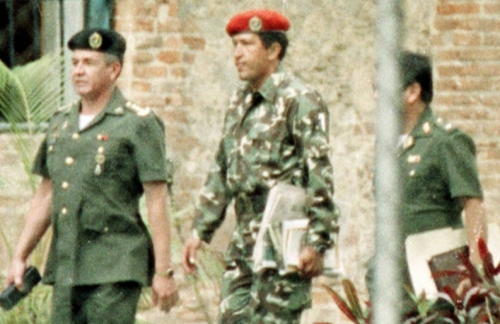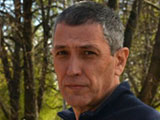The Militarist Revolution, Failure Reinvented
by Israel Centeno / March 13, 2013 / No comments
After Hugo Chávez’s death, Israel Centeno refers to the riot of 1989 and the coup d’etat of 1992 to explain how Venezuelan society, nostalgic of strong men and military symbols, opened a path to the late president’s election.

Hugo Chávez (center) is detained in 1992 after his coup d'etat attempt failed. Photo: Venezuelanalysis, via AP.
The Caracazo was not as spontaneous as some make it out to be, nor was it planned to the utmost detail, as others would like you to believe.

- From his lonely watch post Albert Camus asked who among us has not experienced exile yet still managed to preserve a spark of fire in their soul. “We’re all alone,” Natalia Sedova cried in exile on hearing of her husband Leon Trotsky’s affair with Frida Kahlo. In his novel Night Watch, Stephen Koch follows the incestuous love affair of David and Harriet, wealthy siblings watching the world from their solitary exile. Koch’s writing, Camus’s theories, and Trotsky’s affair all come back to exile and lead me to reflect on the human condition. From my own vantage point, my Night Watch, I will reflect on my questions of exile, writing, and the human condition.

- Israel Centeno was born in 1958 in Caracas, Venezuela, and currently lives in Pittsburgh as a Writer-in-Residence with City of Asylum/Pittsburgh. He writes both novels and short stories, and also works as an editor and professor of literature. He has published nine books in Venezuela and three in Spain.
That riot, on February 27, 1989, was the result of a combination of sentiments: The frustration of the middle classes; the disillusion of intellectual dignitaries waiting to return to the prosperity of the 70s; the disdain for democracy; the ever-present nostalgia for military order, and phone-booth graffiti demanding people “stage a coup already.” All that plus the cherished belief in the end of “the bourgeois order” with a civil-military revolution –in which the dreams of the far left and the developmentalist right would meet– linked to the modernizing projects of the Marcos Pérez Jiménez dictatorship.
Though the mise-en-scène of El cararacazo did not correspond with some of the guerrilla commanders’ desire to lead, it did demonstrate insurrectionary spirit. I don’t know whether anyone else has perceived it as such, but all the romantic clichés of people’s rebellions ran alongside the blood and the anarchy of those hours on February 27. Nevertheless, even with the backlash from the nightmare, Venezuela made an effort, or thought she was doing so, to rethink and save her democratic institutionality.
State reform was required.
Away from the frenzied environment, nobody even considered a revolution. So, despite the turmoil, the country set out to decentralize power. Consequently, the forces that had been pushed to one side brandished their willpower and took their place in Venezuela’s new decentralized reality. The political and democratic victories of both the Radical Cause and the regional governments of the Movement toward Socialism were welcomed, and with them came the pluralization of power across the region and in parliament. For the first time, mayors, city councilmen, and governors were freely elected. The two-party structure of power began to change.
But a return to messianism, conspiratorial obstinacy, and the refusal of the political leaders to make way for new generations coincided with the pre-modern reaction and the shadow of nineteenth-century positivism. The result burst onto our television sets early in the morning of February 4, 1992; a military uprising had attempted to stage a coup d’état.
The nostalgia for the strongman, evoked so many times in both the revolutionary groups’ tough conversations and the dignitaries’ conspiratorial circles, combined with the ambitions of certain entrepreneurs seeking to reclaim their investments while dreaming of “changing everything to keep things the same,” had opened Pandora’s box and unleashed the demons with bayonets. Then a seditious lieutenant colonel said: “For now, our objectives have not been achieved.”
Many thought that would be that after the “for now,” but it was quickly followed by “and forever.”
Barely a handful of days after the attempted coup, during the Carnival of 1992, hundreds of parents paraded their children in rebel paratrooper costumes on Sabana Grande Boulevard. Once again the mounted rebels of the 19th century had occupied the intellectuals’ fantasies. The feats of General Cedeño, Hernández el Mocho, Maisanta, and so on coursed through the Venezuelans’ militarist veins more vibrantly than ever: After the civilians failed, the military symbols of the liberators would reinvent, from within the barracks and alongside “the people,” the great Saudi Venezuela and the distribution of her oil income.




